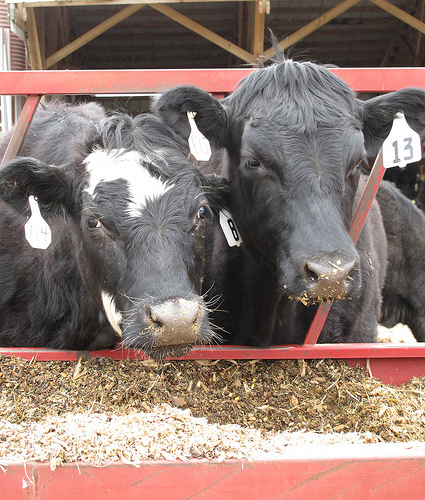
Claims of GM Feed Safety Misleading
The following rebuttal by an agricultural consultant was published in Feedstuffs magazine in response to a misleading article called "GM feed: No risk to animal health”.
The article had highlighted the notorious Van Eenennaam review, which agribiz apologist Jon Entine hailed as the “trillion-meal study” that proved GMOs were safe to eat.
As the consultant points out, there are many problems with the Van Eenennaam review, which mean it’s not possible to draw meaningful conclusions from it on the effects of a GMO diet on animal health.
February 15, 2015 | Source: GM Watch | by
Jon Entine’s “trillion-meal” study on GMO safety exposed again
The following rebuttal by an agricultural consultant was published in Feedstuffs magazine in response to a misleading article called "GM feed: No risk to animal health”.
The article had highlighted the notorious Van Eenennaam review, which agribiz apologist Jon Entine hailed as the “trillion-meal study” that proved GMOs were safe to eat.
As the consultant points out, there are many problems with the Van Eenennaam review, which mean it’s not possible to draw meaningful conclusions from it on the effects of a GMO diet on animal health.
There’s more about the Van Eenennaam review here and here.
—
Letter to the editor: Claims of GM feed safety misleading
Dieter Harle
Feedstuffs.com, Volume:87 Issue:05
28 January 2015
http://feedstuffs.com/blogs-letter-to-the-editor-claims-of-gm-feed-safety-misleading-9422
Dear Editor:
As an agricultural consultant specializing in livestock nutrition, I believe it's vital that farmers get the best advice about what to feed their animals. So I was interested to read the Oct. 6, 2014 Feedstuffs article titled "GM feed: No risk to animal health."
The scientific review that prompted the headline… authored by former Monsanto scientist Alison Van Eenennaam and Amy Young, analyzed 28 years' worth of field data on over 100 billion farm animals from before and after the introduction of genetically modified (GM) feed. The authors concluded that there were no adverse effects from GM feed on livestock health.
However, a closer look reveals that the review and the conclusions drawn from it in the article are misleading, for several reasons:
* The data on the 100 billion farm animals are uncontrolled. They were not generated in a controlled study in which one group of animals is fed a GM diet and the other group a similar non-GM diet, with other conditions kept the same.
Much has changed in livestock husbandry in recent decades, including escalating antibiotic use, which can mask inflammation. The review's data are not controlled for these factors. It is not even known what proportion of the animals' diets was GM. So, no conclusions can be drawn about GM feed safety.
In contrast, controlled feeding studies on farm and laboratory animals have found toxic effects from a GM diet (#1-14). None of these studies have been repeated. The favored response to inconvenient findings has been to attack them using unscientific arguments (#15-17).
* Most of the data are on 49-day-old chickens. A massive 98% of the 1 billion farm animals are poultry, with 92% being broiler chickens. Broiler chickens live for only 49 days before being sent to slaughter — a fraction (2%) of a chicken's natural life span of seven years.
These data give no information on long-term health effects of GM feed in poultry and no useful information on any types of health effects in mammals such as cattle and pigs.
